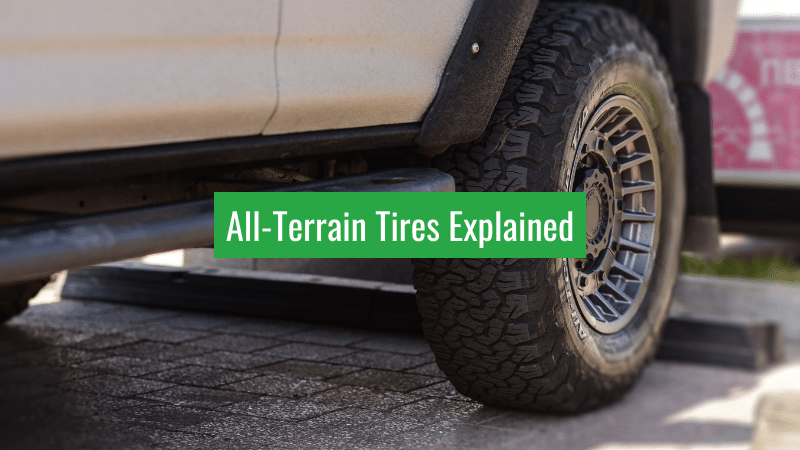All-terrain tires are a popular choice for drivers who need on and off-road capabilities.
These tires feature a unique design with large, sturdy sidewalls and pronounced treads, allowing them to flex and release mud, rocks, and gravel during off-road adventures.
But, are all-terrain tires the right choice for your vehicle?
Let’s dive into what they are and why you might consider using them.
As the name suggests, all-terrain tires are designed to perform well in various driving conditions, including gravel, dirt roads, ice, and snow. They have reinforced sidewalls that can better support vehicles carrying heavy payloads and handle the stresses of uneven off-road driving.
Additionally, all-terrain tires can improve traction on wet, dry, muddy, and rocky roads, making them versatile for both on-road and off-road use.
While all-terrain tires may not be as quiet as regular all-season tires, they are generally quieter than most mud-terrain tires. If low noise levels are important in your driving experience, you may want to look for a less aggressive tread pattern.
By understanding the features and benefits of all-terrain tires, you can make an informed decision on whether they are the right choice for your vehicle and driving needs.
What Are All-Terrain Tires?
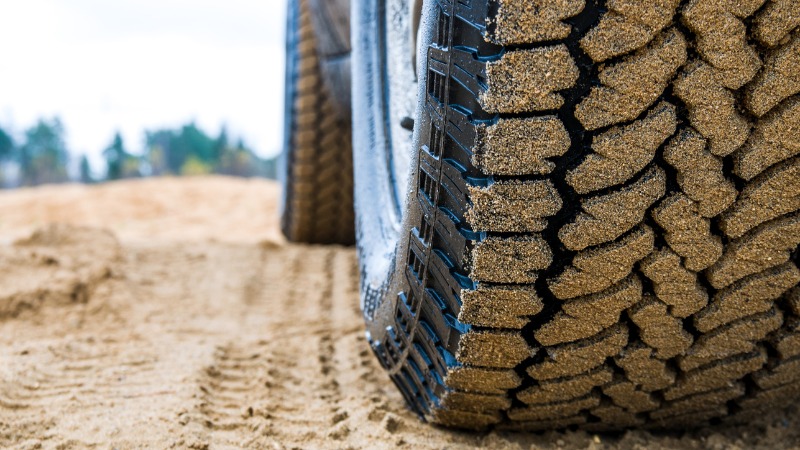
All-terrain tires are designed for both on-road and off-road driving, offering reliable traction and comfortable handling in various conditions. These tires are a hybrid between highway and mud tires, allowing you to drive on wet, dry, and lightly snowy surfaces with ease.
Tread Design
The tread design of all-terrain tires combines the open-tread pattern of off-road tires with the good handling of street tires. This versatile design allows the tire to grip different surfaces effectively, providing optimal traction for driving on various terrains.
In addition, all-terrain tires typically have sipes, which are small grooves that help improve traction in wet or snowy conditions. The deeper these sipes, the better the tire’s wet and snowy handling abilities.
Sidewall Construction
The sidewalls of all-terrain tires are usually reinforced to provide additional strength and durability, making them better suited for off-road driving.
The reinforced sidewalls not only improve the tire’s resistance to punctures and cuts but also offer greater load-carrying capacity for your vehicle, such as when off-roading or towing.
Rubber Compounds
All-terrain tires use a softer rubber compound that grips road surfaces better, providing improved handling and performance.
However, this softer rubber tends to wear out more quickly than the rubber used in all-season tires, so it’s important to consider how and where you’ll be driving your vehicle most often before investing in all-terrain tires.
Types of All-Terrain Tires
All-terrain tires are designed to handle both on and off-road driving conditions. They provide a balance between the smooth ride of highway tires and the rugged durability of off-road tires. Knowing the different types of all-terrain tires will help you decide which one is right for your needs.
Highway All-Terrain Tires
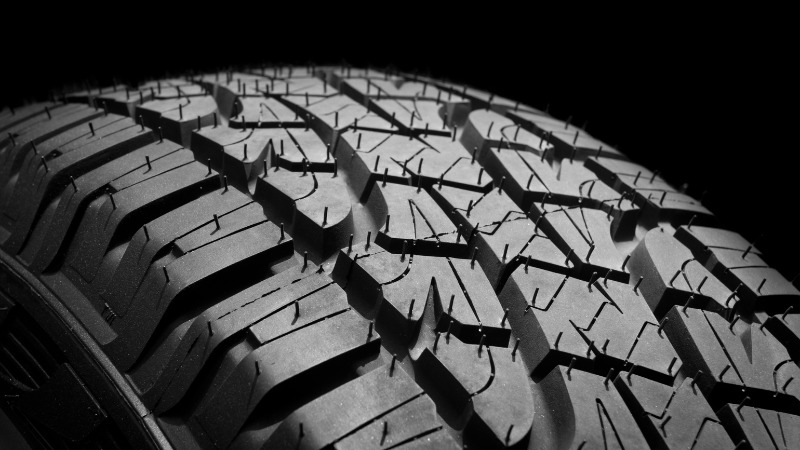
Highway all-terrain tires are designed for drivers who spend most of their time on paved roads. These tires offer a comfortable ride and good handling, while still providing some off-road capabilities.
The large, sturdy sidewalls and tread patterns found on all-terrain tires enable them to flex and release with mud, rocks, and gravel.
These tires are also considered all-season tires, which means they perform well in various weather conditions. They are a great choice for SUVs, CUVs, and light trucks that are primarily driven on paved roads but may occasionally venture off-road or encounter less-than-ideal weather conditions.
Off-Road All-Terrain Tires
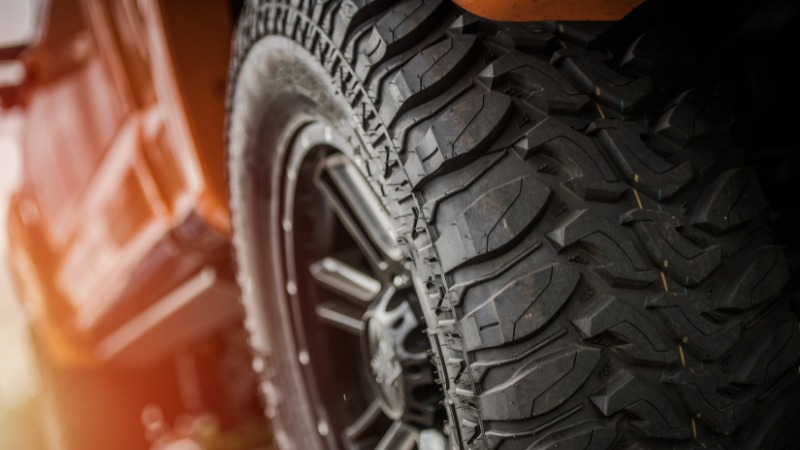
Off-road all-terrain tires are designed to provide better traction and performance in off-road conditions, such as mud, rocks, and uneven terrain. While they are still suitable for on-road driving, their primary focus is on off-road capabilities.
Some of the best off-road all-terrain tires include the Nitto Ridge Grappler, which provides excellent off-road performance.
Typically, off-road all-terrain tires have larger and more aggressive tread patterns and are constructed of more durable materials to withstand the challenges of off-road driving.
These tires may not provide as smooth and quiet of a ride on highways, but their off-road performance will be significantly enhanced compared to highway all-terrain tires.
Mud-Terrain Tires
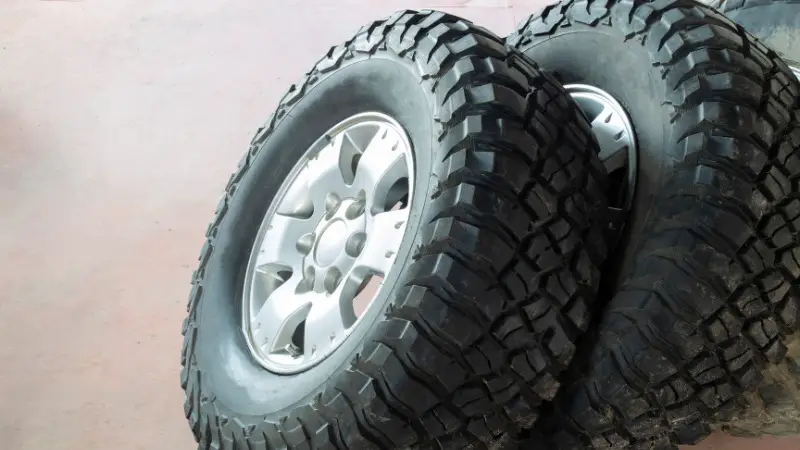
Mud-terrain tires are specifically designed for extreme off-road conditions, such as deep mud, rocks, and other challenging terrains. They have larger and deeper tread blocks than all-terrain tires, which help them to provide better traction and grip in muddy conditions.
Mud-terrain tires are not ideal for regular on-road use, as they can be noisier and less comfortable.
While mud-terrain tires are not technically considered all-terrain tires, they are worth mentioning as an option for those seeking maximum off-road performance.
It is essential to consider how much time you will spend off-roading before selecting the right type of tire, as mud-terrain tires will have a distinctly different feel on the highway compared to highway and off-road all-terrain tires.
Why Use All-Terrain Tires
All-terrain tires offer a wide range of benefits, making them an excellent choice for those who want to get the most out of their vehicle on various terrains.
Improved Off-Road Traction
One of the main reasons to use all-terrain tires is the enhanced off-road traction they provide. The tread design of these tires is specifically crafted to maximize grip on rugged surfaces, such as rocks, mud, and sand.
With all-terrain tires, you can confidently take your vehicle off the beaten path and explore new terrains with ease.
Versatility in Different Conditions
All-terrain tires are designed to perform well in a wide range of weather and surface conditions. They can handle wet, dry, muddy, and even icy roads, thanks to their unique tread patterns and siping.
This means that you can rely on all-terrain tires in various situations, making them an adaptable choice for your vehicle.
In addition to handling different road surfaces, all-terrain tires can also provide improved performance in snow. Siping, which consists of small slits in the tread blocks, helps the tire grip better on snowy surfaces, enhancing its winter capabilities.
Suitable for SUVs and Trucks
All-terrain tires are particularly well-suited to SUVs and trucks. These vehicles often require a tire with the ability to handle various terrains and road conditions without sacrificing on-road performance. The combination of on-road and off-road capabilities that all-terrain tires boast makes them the perfect match for these types of vehicles.
By equipping your SUV or truck with all-terrain tires, you can enhance its performance and versatility, allowing you to tackle various driving situations with confidence.
Comparing Performance
When considering all-terrain tires, it’s essential to understand their performance in various situations. In this section, we’ll compare on-road performance, off-road performance, and handling and traction in snow and ice.
On-Road Performance
All-terrain tires are designed for both on-road and off-road use. While they may not provide the same smooth ride and low noise levels as highway tires, they offer a comfortable and versatile driving experience on paved roads.
The tread features and tire ratings influence their road performance, making them suitable for daily driving on various road conditions.
However, keep in mind that all-terrain tires are generally softer and less durable than standard road tires. A typical all-terrain tire is expected to last around 40,000 miles, while ordinary road tires can last for 60,000 miles or longer.
Off-Road Performance
Off-road performance is a critical aspect of all-terrain tires. These tires offer increased traction on various off-road surfaces, such as rocks, mud, and gravel. They are designed to withstand the rigorous requirements of off-road driving, including puncture resistance and wear.
Flexibility is a significant advantage of all-terrain tires, allowing them to perform well in diverse off-roading scenarios. Remember that tire ratings and tread features can help you determine the best option for your specific off-road pursuits.
Handling and Traction in Snow and Ice
All-terrain tires are suitable for light snowy conditions, but they may not provide the maximum traction needed in harsh winter environments. Dedicated winter tires with the 3PMSF (Three-Peak Mountain Snowflake) rating offer superior traction on snow and ice, improving braking distances and overall handling
However, all-terrain tires still offer suitable performance in snow and ice for many drivers, thanks to their M+S (Mud and Snow) rating. Unless you live in an area with severe winter weather conditions or plan to encounter heavy snow and ice, all-terrain tires can be a very capable and versatile choice.
Factors to Consider When Choosing All-Terrain Tires
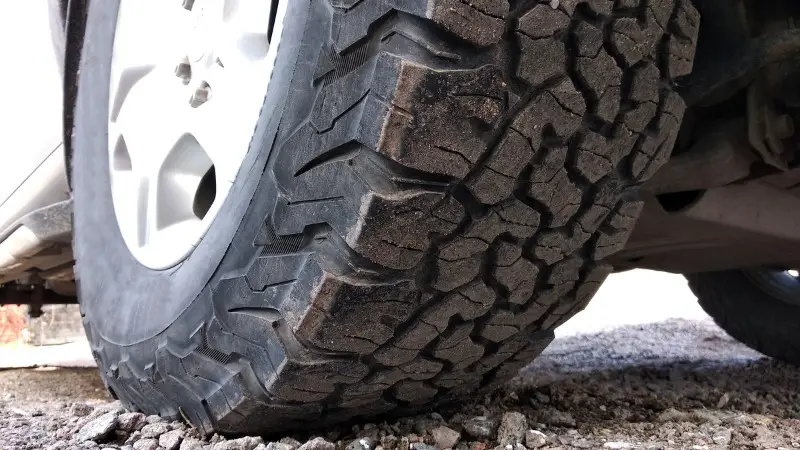
Tread Life and Fuel Efficiency
When choosing all-terrain tires, it’s essential to consider the tread life and fuel efficiency. The tread life of a tire depends on factors like compound, regular rotations, air pressure, and driving habits. Consider a tire’s wear life while making your decision.
Additionally, remember that all-terrain tires may have a slightly lower fuel efficiency compared to highway tires due to their aggressive tread patterns and heavier build.
Noise and Comfort
All-terrain tires may generate more noise on paved roads as their aggressive tread patterns can lead to increased vibration. However, some manufacturers design their all-terrain tires to provide a smoother and more comfortable ride than traditional highway tires.
Price and Overall Value
Weigh the price of the tires against their performance and durability. While some high-quality all-terrain tires may come at a premium, they may provide better value in the long run by offering increased reliability, longer wear life, and superior traction both on and off the road.
Load Ratings and Towing Capacity
Consider the load ratings and towing capacity of the tires you are evaluating. All-terrain tires usually have higher load indices and payload capabilities than highway tires, which is an essential factor for vehicles with heavy-duty needs.
When selecting your all-terrain tires, ensure they can handle your vehicle’s load requirements and towing capacity.
Popular All-Terrain Tire Brands
When looking for all-terrain tires, you can choose from several well-known and reliable brands. Each brand offers a variety of tires designed to suit your specific needs and ensure great performance both on and off-road.
In this section, we will introduce you to some of the popular all-terrain tire brands, and explore their top products.
BF Goodrich
BF Goodrich is a prominent name in the all-terrain tire market, known for its rugged and durable products. One of their standout offerings is the BFGoodrich All-Terrain T/A KO2, which offers excellent traction, durability, and year-round performance, even in snow.
This tire is designed to provide you with confidence during off-road adventures and a comfortable ride on regular roads.
Read next:
Goodyear
Goodyear, another leading tire brand, offers the Wrangler DuraTrac tire, which is known for its solid grip on various surfaces, including mud, gravel, and dirt.
Ideal for full-size pickups and SUVs, these tires withstand even the toughest conditions to provide you with a reliable and comfortable ride.
Michelin
Michelin is synonymous with quality and innovation in the tire industry. Their all-terrain lineup features the highly-rated LTX A/T2, which offers excellent performance both on and off-road, superior tread life, and a comfortable ride.
Falken
Falken’s Wildpeak A/T3W is a popular all-terrain tire appreciated for its aggressive design and reliable performance in various conditions, such as deep snow or rocky terrain. It offers a balance between off-road capability and on-road comfort, making it suitable for your everyday adventures.
Toyo
Toyo offers the Open Country A/T III, an all-terrain tire that combines a long-lasting tread life with impressive off-road performance. The aggressive design provides reliable traction in mud, snow, and rocky terrain while ensuring a comfortable and quiet ride on paved roads.
General Grabber
The General Grabber A/TX is another excellent choice when it comes to all-terrain tires. Offering a balance between off-road performance and on-road comfort, the Grabber A/TX features an aggressive tread design that provides great traction, a long-lasting tread life, and sidewall protection for extra durability.
Kumho
Kumho’s Road Venture AT51 is an affordable all-terrain tire that delivers reliable performance in various conditions. With a balanced tread design, these tires offer good traction on off-road terrains while maintaining stable handling and a comfortable ride on regular roads.
Yokohama
Yokohama’s Geolandar A/T G015 is an all-terrain tire designed to provide impressive traction and a smooth ride in various conditions. Its tread design allows for excellent handling on wet and dry surfaces, making it a versatile choice for off-road adventures as well as everyday driving.
Choosing The Right All-Terrain Tire for Your Vehicle
When choosing the right all-terrain tire for your vehicle, there are several factors to consider.
First, consult your vehicle’s owner’s manual or the placard on the driver’s side door jamb to find the recommended tire measurements, load capacity, and speed rating. Then, consider the type of driving you will be doing, such as highway or off-road, and the climate and terrain you will be driving in.
Look for all-terrain tires with good traction, durability, and a Three-Peak Mountain Snowflake rating for winter conditions. As mentioned earlier, some popular all-terrain tire options include the BFGoodrich All-Terrain T/A KO2, Falken Wildpeak A/T3W, and Goodyear Wrangler DuraTrac.
It’s important to choose a tire that fits your specific needs and driving habits.
Compatibility with SUVs and Light Trucks
All-terrain tires are designed to provide increased traction, control, and durability on various surfaces. These are well suited for SUVs and light trucks because they offer a balanced combination of on-road comfort and off-road performance.
When selecting an all-terrain tire for your SUV or light truck, ensure that the tires are specifically designed for the type of vehicle you have. Most all-terrain tires will have the LT (light truck) designation to indicate this compatibility.
Tips For Maintaining All-Terrain Tires
To make the most of your all-terrain tires and ensure their longevity, proper maintenance is crucial. There are a few essential steps you can take to keep your tires in good condition.
1. Regularly checking air pressures is important, as proper inflation will allow the tire to deliver the best performance and extend its lifespan.
2. Rotate your all-terrain tires every 5,000-8,000 miles to ensure even wear. It’s essential to follow your vehicle manufacturer’s recommendations for tire rotation patterns.
3. Inspect your tires for debris, cuts, and punctures that could cause damage or compromise their performance.
By following these maintenance tips, you’ll be able to enjoy the full benefits of your all-terrain tires, and they’ll serve you well as you navigate various driving conditions with confidence and ease.
Frequently Asked Questions
Are all-terrain tires good for highway driving?
Yes, all-terrain tires are generally good for highway driving. They are designed to provide good traction on a variety of surfaces, including pavement. However, some all-terrain tires may be noisier and less comfortable on the highway than all-season tires.
When choosing all-terrain tires for highway driving, look for tires with a lower noise level and a smoother ride. It’s also important to ensure that the tires are properly inflated and balanced for optimal performance on the highway.
What are the load and size ratings for all-terrain tires?
All-terrain tires come in a variety of load and size ratings. Load rating refers to the amount of weight a tire can safely carry while size rating refers to the tire’s dimensions.
Load ratings are typically indicated by a number on the tire sidewall, such as “121/118R”. The first number (121 in this example) indicates the tire’s load capacity in pounds, while the second number (118) indicates the load capacity for dual wheels. The letter “R” indicates the tire’s speed rating.
Size ratings are typically indicated by a series of numbers and letters on the tire sidewall, such as “LT265/70R17”. The first part of the code (LT) indicates the tire’s type, such as light truck. The second part (265/70) indicates the tire’s width and aspect ratio. The final part (R17) indicates the tire’s diameter in inches.
It’s important to choose all-terrain tires with the correct load and size ratings for your specific vehicle to ensure safe and optimal performance.
Do all-terrain tires have a warranty?
Yes, most all-terrain tires come with a warranty from the manufacturer. The warranty typically covers defects in materials and workmanship and may also include a treadwear warranty. Treadwear warranties guarantee that the tire will last for a certain number of miles before the tread wears down to a certain level.
The length of the warranty varies depending on the tire brand and model, but most all-terrain tires come with a warranty of at least 50,000 miles. It’s important to read the warranty information carefully before purchasing all-terrain tires to understand what is covered and what is not covered.
Hi, my name is Niklas, the head content creator & CEO of Whirling Wheelz. I am very interested in vehicles of all kinds, mainly cars. I have a car mechanics degree from high school and a big hobby of mine is to follow the WRC (World Rally Championship) both online and through travel.

